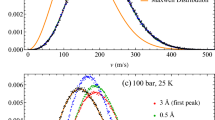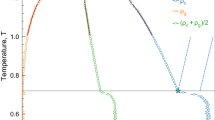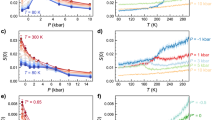Abstract
WE formulate here a general molecular theory of solutions, which predicts a first order phase transition (boiling), volume changes on mixing, and the complete phase behaviour of pure and mixed fluids. Our formulation is based on a simple hole theory of the liquid state.
This is a preview of subscription content, access via your institution
Access options
Subscribe to this journal
Receive 51 print issues and online access
$199.00 per year
only $3.90 per issue
Buy this article
- Purchase on Springer Link
- Instant access to full article PDF
Prices may be subject to local taxes which are calculated during checkout
Similar content being viewed by others
References
Sanchez, I. C., J. appl. Phys. (in the press).
Fisher, M. E., Physics, 3, 255–283 (1967).
Hirschfelder, J. D., Curtiss, C. F., and Bird, R. B., Molecular Theory of Gases and Liquids, 252 (Wiley New York, 1954).
Flory, P. J., Principles of Polymer Chemistry, ch. 12 (Cornell University Press, New York, 1953).
Author information
Authors and Affiliations
Rights and permissions
About this article
Cite this article
SANCHEZ, I., LACOMBE, R. Theory of liquid–liquid and liquid–vapour equilibria. Nature 252, 381–383 (1974). https://doi.org/10.1038/252381a0
Received:
Revised:
Issue Date:
DOI: https://doi.org/10.1038/252381a0
This article is cited by
-
Calculation of complex phase equilibria in the critical region of fluid mixture based on multi-fluid lattice equation of state
Korean Journal of Chemical Engineering (2000)
-
Intermolecular contact interactions and their temperature dependence
Journal of Solution Chemistry (1995)
Comments
By submitting a comment you agree to abide by our Terms and Community Guidelines. If you find something abusive or that does not comply with our terms or guidelines please flag it as inappropriate.



